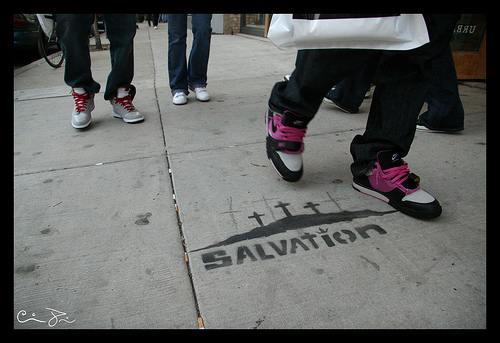We run our website the way we wished the whole internet worked: we provide high quality original content with no ads. We are funded solely by your direct support. Please consider supporting this project.

What Does it Mean to be “Saved”?
The common legal-framework view of salvation encourages people to understand it as mere acquittal, but there is much more to it than that.
First let’s consider what God saved us FROM. It’s certainly true that God saved us from the fatal consequences of our sin by forgiving us. But the New Testament’s view of salvation goes far beyond this when it proclaims that Jesus came to save his people from their sins (Mt. 1:23)—not merely the consequences of those sins. In fact, in expressing God’s perfect, self-sacrificial love on Calvary, Jesus saved us from the ultimate power of sin, which is Satan and the Powers. See Tuesday’s post for more on this.
This theme is emphasized throughout the New Testament. For example, the message Paul received when he first encountered Christ was that he was being sent to the Gentiles
…to open their eyes so that they may turn from darkness to light and from the power of Satan to God, so that they may receive forgiveness of sins and a place among those who are sanctified by faith in me (Ac 26:17-18).
Through Paul, God was going to free people from the power of Satan, the “god of this age” who “blinds the minds of unbelievers” (2 Cor. 4:4) and bring them into the power of God. Because of this, they would be in a position to “receive forgiveness of sins” as well as a place among the community of God’s people. It’s clear that salvation includes forgiveness of sins, but even more fundamentally it includes freedom from Satan’s destructive grip.
So too, Scripture teaches that salvation is about escaping “from the snare of the devil, having been held captive by him to do his will” (2 Tim. 2:26). It is about being “set free from this present evil age” (Gal 1:4) and liberated from our “enslavement to the elemental spirits of the world” (Gal 4:3,cf. Rom 6:18; 8:2; Gal 5:1; Col 2:20; Heb 2:14-15). It’s about being freed from the Accuser, knowing that on Calvary Jesus disarmed the Powers and made a mockery of them (Col. 2:14-15). And it’s about being “enabled … to share in the inheritance of the saints in the light” by being “rescued … from the power of darkness and transferred … into the kingdom of his beloved Son” (Col 1: 12-13) This inheritance involves receiving “redemption, the forgiveness of sins” (Col 1:14), but we have this inheritance only because we’ve been “transferred” from one domain to another.
In Christ, we see, God did a whole lot more than save us from the consequences of sin. He freed us from our enslavement to sin and the evil one who ultimately empowers it.
Secondly, let’s consider what God saves us FOR. As marvelous as all this is, it still doesn’t exhaust the New Testament concept of salvation. For the ultimate purpose of the freedom Christ wins for us is to allow us to share in the wholeness of a marriage-like relationship with God. We are saved from sin and the diabolic Powers in order to participate in the eternally full life of the triune community.
Our marriage to God includes being “seated with Christ … in heavenly places” (Eph. 2:6), made participants in the divine nature (2 Pet. 1:4) and blessed with every spiritual blessing in the heavenly realms (Eph. 1:3). We are given a new identity in Christ that replaced our old identity that was conformed to the pattern of this world. Through the gift of the Spirit, God’s own Life is placed in us and wells up within us like a fountain of living water (Jn. 7:39).
Moreover, having been freed from the blindness induced by the “god of this age,” our minds are now empowered to experience the true God in all his glory and to be gradually transformed into this glory (2 Cor. 3:17-4:6). Through the on-going work of the Spirit in our life, all the qualities that belong to God by nature are gradually imparted to us by grace – love, joy, peace, patience, etc. (Gal. 5:22-23).
God rescues us from sin and Satan in order to share his blessed life with us in a marriage-like relationship that will never end. This freedom from bondage and the wholeness of this relationship is encompassed by the New Testament’s concept of salvation.
Image by Señor Codo via Flickr.
Category: General
Tags: Forgiveness, Salvation, Satan, Sin
Topics: Christus Victor view of Atonement
Related Reading

Who Rules Governments? God or Satan? Part 1
Running throughout Scripture is the motif that depicts God as the ultimate ruler of the nations. On the other hand, the NT teaches that the ruler of nations is Satan. What do we do with these two apparently conflicting motifs? First, because OT authors tended to understand the creation along the lines of a king-centered…

God’s Favor, Not Vengeance
Jesus began his ministry with a brief sermon in his hometown synagogue. Quoting Isaiah 61, Jesus said, The Spirit of the Lord is on me, because he has anointed me to proclaim good news to the poor. He has sent me to proclaim freedom for the prisoners and recovery of sight for the blind, to…

God as Covenant Keeper
Covenant lies at the heart of the biblical understand of God’s relationship to the world. Simply put, a covenant stands in contrast to a contract where parties enter into a quid pro quo arrangement. With a contract an agreement is made to protect oneself. With a covenant, one commits oneself with promises to another for…

Is Despair a Sin? (podcast part 1 of 3)
Greg and Dan discuss despair. Why should a person who cares so much about God’s creation that she despairs also then be guilty of a sin? Episode 575 http://traffic.libsyn.com/askgregboyd/Episode_0575.mp3

Why is the Bible so strict on prohibiting pre-marital sex? What’s the big deal?
Today in western culture people tend to have a rather “recreational” view of sex. It’s just a pleasurable physical activity we engage in. Even people who don’t consciously believe this are influenced by it , since we’re bombarded with this message every day through movies, television shows, radio, magazines, etc. Because we’re influence by this…

Podcast: What Do You Mean When You Say Jesus Entered Into Solidarity with Our Sin?
Greg talks about God’s passion for, unity with, and pursuit of his beloved bride. http://traffic.libsyn.com/askgregboyd/Episode_0330.mp3
